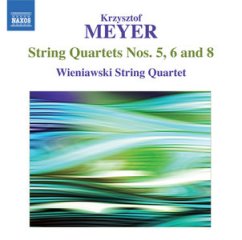Krzysztof Meyer - String Quartets Nos. 5, 6 and 8 (2008)
Krzysztof Meyer - String Quartets Nos. 5, 6 and 8 (2008)

01. String Quartet No. 5, Op. 42 - I. [0:06:46.24]
02. II, [0:05:55.86]
03. III. [0:01:53.76]
04. IV. [0:09:43.33]
05. V. [0:04:21.32] play
06. String Quartet No. 6, Op. 51 - I. Con moto [0:05:29.01]
07. II. Prestissimo [0:03:24.76]
08. III. Lento [0:10:52.56]
09. String Quartet No. 8, Op. 67 - I. Tranquillo [0:04:45.04]
10. II. Furioso [0:03:36.33] play
11. III. Infernale [0:04:04.14]
12. IV. Drammatico [0:04:29.69]
13. V. Tranquillo [0:06:08.42]
Wieniawski String Quartet:
Ryszard J.Osmoliński - I violin
Monika S.Osmolińska - II violin
Róża Wilczak-Płaziuk - viola
Arkadiusz Płaziuk - cello
The Wieniawski String Quartet makes its Naxos début with three important chamber compositions by its much-awarded compatriot Krzysztof Meyer, whose musical homeland is the chamber music of Viennese Classicism, enlivened with a dash of Bartok’s spicy musical accent. The composer describes his twelve string quartets as ‘sound-stories told with musical elements that the listener would care about, and not just a stream of acoustic stimuli’. High drama, playfulness, intense lyricism and narrative cohesion are the hallmarks of these splendid works.
The more I hear of Krzysztof Meyer’s music, the more he impresses me. So far, Meyer has written twelve quartets which places him amongst a select group of contemporary composers – Vagn Holmboe and Peter Maxwell Davies immediately spring to mind – who have given their time to this most intimate of media. These three works show different sides to Meyer’s art and are a most welcome addition to the growing number of recordings of his music.
Quartet No.5 has a prominent part for the cello – indeed, the first movement, all 6:46 of it, is a soliloquy for that instrument. This is a very serious rumination on the material presented. The mood is dispelled by a fast and violent music, which plays with metre and will set your head spinning trying to work out what’s going on. The third movement is a very short, and delicate, muted elegy. This leads into the fourth movement, again featuring the cello singing its song against a rich chordal background, until the rhythmic complexities of the second movement reappear and the argument starts all over again. A solo cello, then violin, lead us into the finale which is another elegy, and whilst it is not a musical summation of the whole work, it is emotionally.
The 6th Quartet comes as quite a shock after this intense work. The opening is lively and full of fun, but the tempo slackens and things become more serious, but never as bleak as parts of the 5th Quartet. The middle scherzo is light and frothy but the finale, which plays for longer than the other movements put together, is another elegy, deeply felt and brilliantly executed. The 8th Quartet has a more varied palette, and, despite what you might hear, is somewhat more conventional than the two other quartets on this disk. It also, strangely, contains more than a passing reference to the Shostakovich of his 8th Quartet. Meyer wrote the first book in Polish on the Russian composer. Having written this, though, I must point out that if you expect to hear Shostakovich in this music you won’t – it’s just the feel of the thing. A second scherzo is more mysterious, muted and a little macabre. The fourth movement is drama and the fifth a slow, reserved coda to the whole work.
Meyer says, “My musical homeland is the chamber music of the Viennese classic, extended by the most splendid of twentieth century musical worlds – Bartók’s”. Certainly I can hear, in these works, a continuation of that line of composition. That Meyer should be descended from those earlier masters – and Meyer is referring to Beethoven and Schubert, not Schönberg and his circle – is right and proper for here is chamber music which is meaningful, vital and expertly crafted. Every bit as important and essential as those earlier composers.
Full marks to Naxos for issuing this disk, for Meyer is a major figure and we cannot afford to miss his work. The recording is excellent, but the booklet suffers from, what I imagine to be a poor translation of the original Polish text. I cherish the idea that, “In String Quartet No.8 the instruments are exclusively playing arco and pizzicato.” I suppose that he means that no unusual methods of playing are required – such as the Bartók pizzicato, col legno or sub ponticelli. But as Meyer does none of these elsewhere one wonders why it was thought necessary to mention it. I am also at a loss to understand, “Quartet No.5 deserves to be called a chamber sinfonia concertante, with the cello in the foreground. This impression is created by the impetus of this piece, in which the five movements combine into two extended arches…” Surely it deserves to be called a sinfonia concertante because the cello is given a soloistic role from time to time. These notes really should have been checked before they were printed – it is the only fault in an otherwise welcome and exciting issue of very stimulating music. ---Briggs, MusicWeb International
download: uploaded filecloudio yandex 4shared mediafire solidfiles mega
Last Updated (Saturday, 22 February 2014 21:23)








